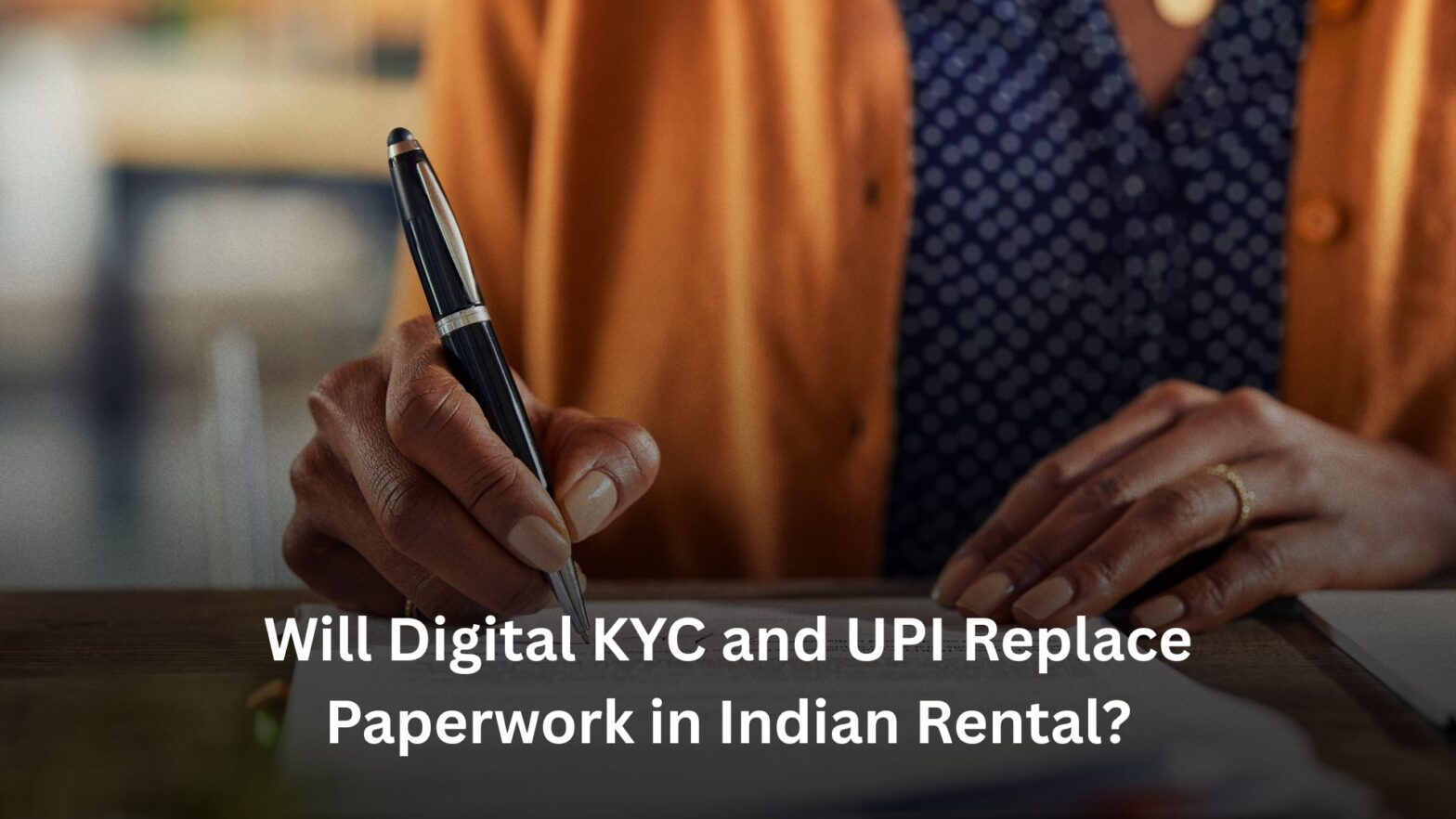Will Digital KYC and UPI Replace Paperwork in Indian Rentals?
Imagine renting a home without a stack of documents, no long queues, no visits to government offices – just a few taps on your phone. Thanks to digital tools like UPI and Digital KYC, India’s rental ecosystem is undergoing a quiet revolution now. With instant rent payments, digital agreements, and online identity verification becoming more common, but the question arises
Can these innovations fully replace paperwork in India’s rental business?
Let’s explore the current system, how digital tools are changing things, the advantages and drawbacks, and where platforms like RentOk fit into this shift.
What is UPI?
UPI (Unified Payments Interface) is a real-time payment system developed by the National Payments Corporation of India (NPCI). It allows users to transfer money instantly using mobile apps like Google Pay, PhonePe, Paytm, etc., without needing to enter bank account numbers or IFSC codes. All it takes is a Virtual Payment Address (VPA) or a QR code.
By May 2025, UPI transactions accounted for over 85% of all digital payments in India, showing just how deeply embedded it is in everyday life from paying for groceries to transferring rent.
What is Digital KYC?
KYC (Know Your Customer) is the process of verifying someone’s identity, traditionally done using physical documents.
Digital KYC simplifies this by allowing identity verification through:
- Aadhaar-based OTP authentication
- Video KYC
- ePAN & DigiLocker integration
This process is now widely used for opening bank accounts, buying SIM cards, and signing up for financial services and is now entering the rental space as well.
Paperwork in India’s Rental System Today
Despite technological progress, renting a house in India still involves a lot of paperwork, such as:
Key Documents:
- Rent Agreement (on stamp paper, often registered)
- ID Proofs (Aadhaar, PAN, Passport)
- Address Proofs
- Police Verification of tenants
Why Digital Police Verification?
Police verification helps ensure the safety and legality of tenancy. Landlords must submit tenant details to the local police station a process that varies by city. While some cities like Pune, Delhi, and Bengaluru have online police verification, but many still require offline visits and physical forms.Which in time might go digital aswell.
How UPI & Digital KYC Are Transforming Rentals
1. UPI for Rent Collection
- Instant Payments: No delays, no cheques.
- 24/7 Convenience: Pay from anywhere, anytime.
- Digital Record: No need to maintain receipts your transaction history is stored digitally.
- Platforms like RentOk allow PG/hostel owners to collect rent through UPI and track monthly collections in one dashboard.
Example: RentOk auto-notifies tenants and tracks rent status using integrated UPI links helping owners avoid awkward payment reminders.
2. Digital KYC for Tenant Verification
- Online ID Checks: Landlords can verify Aadhaar or PAN instantly through OTPs or DigiLocker links.
- Faster Onboarding: No waiting for physical documents.
- Video KYC: Adds a layer of security and real-time face verification.
- Integration with Police Portals: Some platforms are starting to connect tenant KYC with online police verification APIs in major cities.
Digital Agreements & E-Signatures
With platforms offering e-signing and e-stamping, agreements can now be signed and shared from anywhere.
From July 1, 2025, as per the latest update by the Ministry of Housing, digital stamp duty is mandatory for all rental agreements in several states, starting with Maharashtra and Karnataka.
Pros and Cons of Digital Documents in Rentals
| Advantages | Disadvantages |
|---|---|
| ✅ Instant verification & payments | ❌ Not all cities support online police checks |
| ✅ Less paperwork, no physical storage | ❌ Older landlords may not trust digital tools |
| ✅ Easier to maintain rent records | ❌ Risk of fraud or phishing if misused |
| ✅ Saves time for landlords & tenants | ❌ Technical glitches can delay onboarding |
| ✅ Eco-friendly & scalable | ❌ Legal disputes still often require physical copies in court |
Will Paperwork Disappear Completely?
Not entirely at least not yet. Legal processes still require properly drafted and registered agreements, whether in digital or paper form. And while cities like Mumbai and Bengaluru are moving toward online police verification and e-stamping, many towns still operate on paper.
That said, the amount of physical paperwork is rapidly decreasing, especially with platforms like RentOk, which digitize everything from rent collection to tenant onboarding.
Final Thoughts
The future of renting in India is undoubtedly digital-first.
- UPI makes rent collection instant and transparent.
- Digital KYC simplifies tenant verification.
- Platforms like RentOk are building the bridge between landlords, tenants, and technology.
While legal paperwork won’t vanish overnight, it will soon exist mostly in digital formats making the process faster, safer, and far more convenient.
In short, UPI and Digital KYC won’t just reduce paperwork they’ll help redefine trust, speed, and simplicity in the rental ecosystem.
FAQs
1. Is it legal to sign a rent agreement digitally?
Yes. As per the Information Technology Act, 2000, Aadhaar-based e-signatures are valid. From July 1, 2025, digital stamp duty is mandatory in some states.
2. How can I verify a tenant online?
Through Digital KYC methods such as Aadhaar OTP, video KYC, and DigiLocker sharing. Some cities also offer online police verification.
3. How does RentOk help?
RentOk helps landlords and PG/hostel operators:
- Collect rent via UPI
- Track payment status
- Onboard tenants using digital KYC
- Reduce paperwork with digital agreements
4. Is UPI safe for rent payments?
Yes. UPI is regulated by NPCI and protected by multiple layers of authentication. Just ensure you’re using verified apps.
5. Can I avoid police verification if I do Digital KYC?
No. Police verification is a legal requirement in many cities and must still be done, though it can be initiated online in supported locations.

